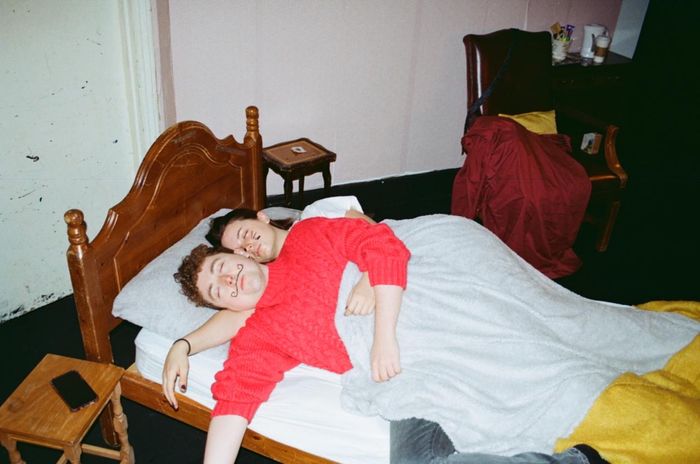The Judas Kiss: history in the making
This story of the famous scandal remembers the pain, politics and people behind it

Unbeknownst to the vast majority of locals, Lord Alfred Douglas, better known as Bosie and even better known as Oscar Wilde’s lover, is buried opposite the McDonald’s in the town where I grew up. Last time I visited, his grave was remarkable only for a small black-and-white photo of him and a little ceramic planter, covered in rainbow stripes and patterned like a pair of wellington boots.
The Judas Kiss, written by David Hare and directed by Melania Hamilton, traces how Bosie went from the fast-living, notorious decadent to the man buried beneath that unknown, unvisited grave. It follows the steady decline in fortune faced by both Douglas and Wilde after Wilde was brought to trial for his homosexuality.
“The organic staging is characteristic of the lightness of touch deployed throughout this production”
Staged in the Old Divinity School’s Lightfoot Room, the play offers up a voyeuristic look at the pain, politics and people behind the infamous scandal. The room is lit only by the overhead fluorescents and the open windows, leaving the actors with nowhere to hide – not that they need it. The staging is simple but beautiful: a bed surrounded by a litter of bottles and books, framed by the gorgeous wooden beams of the room; due to the lack of wings, actors appear and disappear into the corridor behind the audience, making the space bustle with life. The beautiful live piano accompaniment is subtle and never intrusive, and was complemented beautifully by the faint sound of the city carrying on outside. This organic staging is characteristic of the lightness of touch deployed throughout this production, which drips with poignancy and human drama, but never once tips over into hamminess. Despite the small cast, with the majority of scenes comprising only two or three actors, the stage never felt empty, with the cast more than able to fill the space and command the room.
The two lead actors, in particular, were incredible. Natalia-Paloma Zinger’s Bosie was startlingly original, with an unexpectedly anachronistic but extremely effective Hollywood-style starlet quality. Her capricious, wide-eyed approach to her character was remarkable in its ability to convey both Bosie’s fickleness and selfishness, but also his depth of feeling and genuine adoration for Wilde. Charlie Scott-Haynes delivered one of the best, if not the best, performances I have ever seen in Cambridge, nimbly skipping between Wilde the intellectual, Wilde the dandy, Wilde the cold-hearted, Wilde the politician, Wilde the family man, and Wilde the lover. Her performance methodically peeled away the layers of legend and reality that encircle Oscar Wilde, holding in equal balance his glitzy glamour and raw, emotional humanity. As a duo, they blended cutting cynicism and devastating honesty with an acuity that I cannot praise enough.
“Charlie Scott-Haynes delivered one of the best, if not the best, performances I have ever seen in Cambridge”
One gripe, then. The play is long, running to two and a half hours. The actors rise valiantly to the challenge, delivering performances that remain convincing and fresh throughout, but it isn’t quite enough to stave off the inevitable impatience. Though there was nothing to criticise in the performance itself, which elegantly carried off the stripped-back squalor and despair of the second act, I couldn’t help but wish that the director had been bold and made some significant cuts to Hare’s indulgently long final dialogues.
All in all, it was incredible to watch history be written. To see Bosie go from the admirable, determined lover to the notorious, spoiled, self-absorbed brat in such a subtle way was fascinating. Throughout the play, that lonely gravestone loomed in my thoughts as it slowly became reality: Bosie, a pathetic antagonist who has gone down in history as the man who left Wilde, and Wilde as the lonely, destroyed artist sitting alone on his bed at the end of the play.
 Comment / Cambridge’s tourism risks commodifying students18 April 2025
Comment / Cambridge’s tourism risks commodifying students18 April 2025 News / Cambridge researchers build tool to predict cancer treatment success19 April 2025
News / Cambridge researchers build tool to predict cancer treatment success19 April 2025 News / Varsity ChatGPT survey17 April 2025
News / Varsity ChatGPT survey17 April 2025 News / Cambridge researchers find ‘strongest evidence yet’ of life on distant exoplanet18 April 2025
News / Cambridge researchers find ‘strongest evidence yet’ of life on distant exoplanet18 April 2025 News / Greenwich House occupiers miss deadline to respond to University legal action15 April 2025
News / Greenwich House occupiers miss deadline to respond to University legal action15 April 2025






